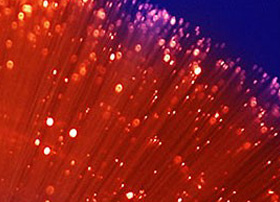Glossary
Distributed Feedback Laser
A distributed Feedback laser is a type of Diode Laser that uses Diffraction gratings rather than mirrors to create the resonance and oscillation in the cavity. A distributed feedback laser produces a finer Range of wavelengths than a Fabry-Perot cavity. A Distributed Bragg Reflection laser is a similar technology that uses Bragg gratings.
A distributed feedback laser replaces the back mirror with a grating along the cavity axis. Instead of being reflected abruptly like a metal mirror would, the grating reflects a little over each part of the grating until at the back of the grating the Light has petered out. Of course, since the light is being reflected by the grating the reflected light is always in the correct phase no matter IF it was reflected from the front or back of the grating. The distributed nature of the Reflection sharpens the cavity resonance and distributed feedback lasers are typically of much narrower Bandwidth than the SAME laser with mirrors. Mostly seen in laser diodes, distributed feedback can also be done with non-linear optics, volume gratings, and other more esoteric optical elements.
DFB (Distributed Feed Back) lasers have a periodic, spatially-modulated gain, which gives a strong selectivity for the Wavelength that matches the period of the Gain modulation. DFB lasers lase in the same single Longitudinal Mode from threshold up to the maximum operating power while Fabry-Perot lasers hop from one longitudinal Mode to another as the current and/or temperature change.

